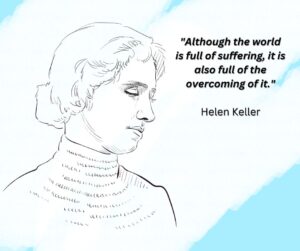Helen Keller, an extraordinary individual whose life and legacy have inspired millions, once said, “Although the world is full of suffering, it is also full of the overcoming of it.” This profound statement, emanating from someone who faced immense personal challenges, serves as a testament to the resilience and strength inherent in the human spirit. Keller's words resonate deeply, offering a beacon of hope and a reminder of the indomitable capacity for triumph over adversity. This article delves into the significance of Keller's quote, exploring its implications through the lens of her life and the broader human experience.
Helen Keller: A Testament to Resilience
To fully appreciate the depth of Keller's quote, it is essential to understand the context of her life. Born in 1880, Keller was rendered blind and deaf at the age of 19 months due to an illness. In a world unprepared for such disabilities, Keller's future seemed bleak. However, her life took a dramatic turn when Anne Sullivan, her dedicated teacher, entered her life. Through perseverance and innovative teaching methods, Sullivan helped Keller break through the isolation imposed by her disabilities, enabling her to communicate with the world.
Keller's subsequent achievements are nothing short of remarkable. She became an accomplished author, activist, and lecturer, advocating for the rights of people with disabilities and other marginalized groups. Her life's work and accomplishments exemplify the essence of her quote. Despite the suffering she endured, Keller not only overcame her personal challenges but also dedicated her life to helping others do the same.
The Universality of Suffering
Suffering is a universal aspect of the human condition. It manifests in various forms, including physical pain, emotional distress, and existential crises. Wars, natural disasters, diseases, and personal losses contribute to the tapestry of human suffering. In acknowledging this, Keller's quote does not shy away from the reality of pain and hardship. Instead, it recognizes suffering as an integral part of life, a common thread that binds humanity.
The acknowledgment of suffering is crucial because it fosters empathy and compassion. When we recognize that others endure pain, we are more likely to reach out and support them. This shared understanding creates a sense of solidarity, reminding us that we are not alone in our struggles. Keller's insight encourages us to confront suffering with courage and compassion, both for ourselves and for others.
The Overcoming of Suffering
While suffering is an inevitable part of life, Helen Keller's quote emphasizes the equally inherent capacity for overcoming it. This aspect of her statement is profoundly hopeful, highlighting the potential for growth, resilience, and transformation. Overcoming suffering does not necessarily mean eradicating it; rather, it involves finding ways to cope, adapt, and thrive despite it.
One of the most powerful ways humans overcome suffering is through connection and support. Communities, families, and friendships provide essential networks of care and encouragement. When individuals come together to support each other, they create a collective strength that helps mitigate the impact of suffering. This communal resilience is evident in the aftermath of tragedies, where acts of kindness, solidarity, and mutual aid often emerge.
Another key to overcoming suffering is the development of inner strength and resilience. Keller's own life is a prime example of this. Despite the immense challenges she faced, she cultivated a resilient spirit and an unyielding determination to succeed. This inner strength can be nurtured through various means, such as mindfulness practices, therapy, and personal reflection. By building resilience, individuals can navigate their suffering with greater fortitude and hope.
The Role of Purpose and Meaning
Finding purpose and meaning in life is another crucial element in overcoming suffering. Viktor Frankl, a renowned psychiatrist and Holocaust survivor, emphasized this in his seminal work, “Man's Search for Meaning.” Frankl argued that even in the most harrowing circumstances, individuals could endure suffering if they found a sense of purpose and meaning in their experiences.
Keller's life was imbued with a profound sense of purpose. Her advocacy for disability rights and social justice gave her a mission that transcended her personal struggles. By dedicating her life to causes greater than herself, she transformed her suffering into a source of strength and motivation. This transformation is a powerful reminder that finding purpose can help individuals rise above their pain and contribute positively to the world.
The Impact of Overcoming Suffering
The act of overcoming suffering has far-reaching implications, both for individuals and for society as a whole. On a personal level, overcoming adversity fosters growth, resilience, and self-awareness. Individuals who navigate their suffering successfully often emerge stronger and more compassionate, equipped with a deeper understanding of themselves and the world around them.
On a societal level, stories of overcoming suffering inspire and uplift communities. Helen Keller's life story has inspired countless individuals to persevere in the face of their own challenges. Her advocacy work has also contributed to significant social change, promoting greater inclusion and equality for people with disabilities. The impact of overcoming suffering extends beyond the individual, creating ripples of hope and transformation that benefit society at large.
FAQ: Understanding the Balance Between Suffering and Overcoming Adversity
Q: Why is it important to acknowledge both suffering and overcoming it?
A: Acknowledging suffering fosters empathy and compassion, as it helps us recognize that others face challenges too. At the same time, focusing on overcoming suffering highlights the potential for growth and resilience. This dual recognition encourages us to support each other, find strength within ourselves, and remain hopeful despite difficulties.
Q: What are some examples of overcoming suffering?
A: Examples include:
- Personal Growth: Someone recovering from a major illness and emerging stronger and more self-aware.
- Community Resilience: Communities coming together to rebuild after natural disasters, offering mutual aid and support.
- Social Movements: Marginalized groups fighting for their rights and achieving greater equality and inclusion.
Q: How does finding purpose and meaning help in overcoming suffering?
A: Finding purpose and meaning helps individuals see beyond their immediate pain and connect their experiences to a larger context. This sense of purpose can provide motivation, direction, and hope, making it easier to endure and transcend suffering. It transforms adversity into a source of strength and inspiration.
Q: What role does resilience play in overcoming suffering?
A: Resilience is the ability to adapt and recover from adversity. It involves maintaining a positive outlook, staying flexible, and developing coping strategies. Resilience helps individuals withstand challenges, bounce back from setbacks, and continue pursuing their goals despite difficulties.
Q: How can communities foster the overcoming of suffering?
A: Communities can foster overcoming suffering by:
- Creating Support Networks: Establishing systems of care and support for those in need.
- Promoting Empathy: Encouraging understanding and compassion among members.
- Facilitating Access: Ensuring access to resources like healthcare, education, and mental health services.
- Advocating for Change: Working together to address systemic issues and promote social justice.
Q: What is the ultimate takeaway from this quote?
A: The ultimate takeaway is that while suffering is an unavoidable part of life, the human capacity to overcome it is equally significant. By acknowledging both suffering and our ability to triumph over it, we can cultivate resilience, foster compassion, and remain hopeful. This balanced perspective empowers us to navigate life's challenges with strength and optimism.


















